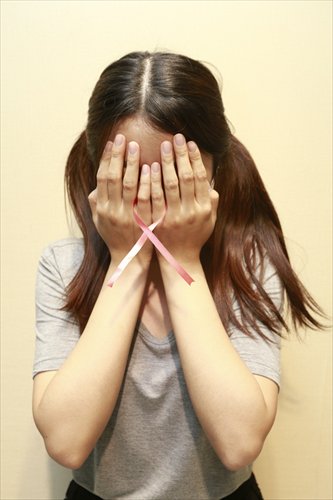Students at risk
Failure to put knowledge into practice leads to increasing youth HIV infections

Medical experts say HIV infections among young people is becoming more common. Photo: Li Hao/GT
Constant diarrhea, stomach ache for no apparent reason and a runny nose. These were some of the symptoms 22-year-old Hua Ying (pseudonym) was experiencing when she asked for a few days off from her university, to have a rest. She thought she had just caught a cold, or ate something bad. But none of the medicine she took was effective, and new symptoms appeared.
She felt muscular soreness all over her body and was extremely thirsty all the time. That's when she realized something was seriously wrong, and went to the hospital. Telling the doctor her symptoms, she was told to take an HIV test. The result was positive.
According to a Beijing Youth Daily report on August 12, Zhang Tong, director of the Infectious Diseases Center at Beijing's Youan Hospital, said HIV positive infections among young people between the ages of 14 and 20, is becoming more common. On World AIDS Day last year, Zhang's hospital organized free HIV tests in Sanlitun. Several hundred university students were tested and 10 percent of them tested positive for HIV.
Wu Zunyou, director at the Chinese Center for Disease Control and Prevention, said in the report that by October 2014, provinces with more than 100 reported HIV infected students [university and middle school] had surpassed 10, including Beijing. "Thousands of young students get infected each year. Although the absolute figure is not very high, the spread of the disease among the youth is gaining momentum."


China needs to improve its sex education from kindergarten to high school, to lower the HIV infection rate. Photos: Li Hao/GT, IC
Promiscuous behavior
Hua, who was single, had never had a blood transfusion. The only possible way she could have contracted HIV was by having one-night stands with strangers. "I did it at most five times a year. Everyone looked healthy and energetic and most of the times I used a condom, except when having oral sex," she said.
Under too much strain, Hua said she thought about finding the person who infected her and killing him as revenge. "But it doesn't make any sense. Now my only hope is to live a long life since I'm so young," she said.
Ma Yi (pseudonym) celebrated his 21st birthday last week, but it did not make him happy, because he has been constantly worrying that it might have been his last birthday. In February he discovered two weird red spots on his foreskin. He went to the hospital and was told he had syphilis.
"I was scared to death. But it was really nothing compared to the second laboratory test report I received," said Ma. "That was an HIV positive notice, which was like a death sentence to me."
Usually people who test positive for a sexually transmitted disease such as syphilis, genital warts and herpes, are advised to be tested for HIV too, which is what Ma did, although he did not show any signs of the disease.
Upon receiving the diagnosis, Ma disappeared from class for a week, travelling to another city where he contemplated committing suicide. "I did not know how to face my classmates and my parents. It's better to die in an 'accident' than die from AIDS."
He eventually returned to Beijing and began to educate himself about the disease. He also started systematic medical treatment.
"I am young and have my whole life ahead of me. I think this is retribution for my promiscuous life," said Ma, who had sex for the first time when he was in junior high school.
He lives in a rented house off campus in Beijing and usually brought home girls from university, night clubs or ones he met on the Internet. "I am not the only one who behaves like this," said Ma. "I remember when I was in high school, there were others in my class who were not virgins."
The National Health and Family Planning Commission released a report on the state of the Chinese families on May 13. The report was based on a survey of over 32,500 families in 31 provinces and cities in China. According to the findings, the average age of first time sex is 15.9 years old, but only 26.7 percent of them used contraceptives.
Additionally, the report pointed out that about three fifths of teenagers aged between 14 and 17 did not know about contraceptive methods.
"Since information technology is highly developed, socializing with strangers is becoming extremely popular," said Peng Xiaohui, a sexologist at the Wuhan-based Central China Normal University. "Students are becoming more open, with multiple sexual partners, which has become an irresistible trend. It's impossible to constrain them and convince them to return to conservative, traditional ethics and norms."
A different secret
Younger HIV positive patients, like Hua and Ma, have a different experience of the disease than older patients who are already employed. With no income, it is difficult to take expensive drugs and treatment if they do not tell their parents about their HIV status.
Hua said she did not plan on ever telling her family or her friends about her disease, and she used a fake name when taking the test. "I'd rather die than have to tell my parents," she said.
As a university student who cannot afford expensive treatment, she has only accepted the free drugs available at the Beijing Center for Disease Prevention and Control. Luckily, the free drugs are proving effective and her symptoms have been brought under control.
Hua has been trying her best to save money for more expensive medical treatment. She now has a part-time job teaching piano, charging 500 yuan ($78) per hour. Currently in her third year of university, she is planning to get a job even before she graduates so that she can earn more money for treatment.
"If my students' parents know I am HIV positive, I bet none will bring their children to me," said Hua. "I am also afraid of health checks. If an HIV test is included in an employment check one day, I may never find a job."
Unlike Hua, Ma told his parents about his illness after he learned how much it would cost for the best anti-retroviral. His parents were so sad about the news. They came to Beijing, fearing that Ma might commit suicide, and paid for his treatment and nutritious food and medicine to boost his immunity. To date, they spend about 20,000 yuan ($3,124) each month on Ma's health.
"I feel guilty," said Ma. "Sometimes I think it would have been better for me if I had become infected when I was older, after my parents' deaths."
Awareness and education needed
Chen Zihuang, a staffer working for China's largest gay information website danlan.org, has been organizing free HIV tests for gay people in Beijing. He said that in 2012, 10 percent of gay people coming for a free test were students, and now the proportion is 30 percent.
He said the high rate of HIV infections among young people was indicative of them not acting on their knowledge. "They know that HIV can be transmitted through sexual intercourse and using condoms can lower the risk. But why don't they use condoms? Their knowledge fails to be applied in practice," he said, also bemoaning the lack of sex and gender education in Chinese schools and universities.
Peng went to Sweden in 2002 for a scholar visit and learned that at that time 90 percent of their high school students had experienced having sex. "We can imagine the rate is higher in university. But their HIV and STD infection rate and unplanned pregnancies are among the lowest in the world."
According to Peng, the low HIV infection rate in Sweden can be ascribed to the popularization of sex education from kindergarten to high school. There are also clinics offering free sexual health consultations, treatment and condoms.
Peng suggested free sexual health clinics which offer HIV and STD testing and treatment at every school and residential community.
In light of the trend that Chinese youths are having sex earlier and their poor knowledge of sexual health, Peng said the fundamental solution is to improve the general perception of sex and thoroughly implement sex education at schools nationwide.
According to a 2013 cnr.cn report, more than 50 primary and middle schools in Beijing have started sex education lessons, and parents are getting more receptive toward the classes. "In 2011, when the first sex education textbook was published, many parents were worried about whether it was too explicit, and were reluctant to let their children learn too many detailed things about sex," said Zheng Ju, headmaster of Anhuili Primary School, Chaoyang district. "But two years later, over 95 percent of parents agreed to the sex education."
Wang Zuoshu, head of the China Association for Non-Government Education, who proposed the legislation for HIV/AIDS prevention and treatment in March, said that sex education for teenagers is an important AIDS prevention method, according to a report from ifeng.com. "Since HIV is infecting younger and younger people, sex education, especially on how to prevent sexually transmitted diseases, is the most effective measure to reverse this trend," said Wang.